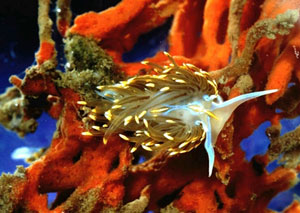 |
New MBL Study Shows Cancer Drug May Have Future in Alzheimer's Treatment
Marine Snail Plays Key Role in Discovery
WOODS HOLE, MA - Scientists at the MBL (Marine Biological Laboratory) in Woods Hole, Massachusetts and the Blanchette Rockefeller Neurosciences Institute (BRNI) in Rockville, Maryland have reported that the anti-cancer drug bryostatin may serve as a potential treatment for Alzheimer's Disease.
The research results, published in the November 8 issue of the Proceedings of the National Academy of Sciences, suggest that bryostatin may stimulate the production of proteins in cells that are essential for long-term memory. Early Alzheimer's patients typically cannot store new long-term memories. Studies in mice and the marine snail, Hermissenda show that bryostatin can promote the proteins required to construct permanent memory and biochemically enhance precisely this storage of long-term memory.
 |
|
Marine snail Hermissenda.
Photo credit: Alan Kuzirian
|
|
During the year-long study, MBL researchers Alan Kuzirian and Herman Epstein collaborated with Daniel Alkon, a former MBL scientist who is currently Scientific Director at BRNI. The scientists exposed the marine snails to seawater containing bryostatin in the days leading up to memory tests. The research showed that memory could be enhanced in the snails if the animals were pre-treated with the drug.
The researchers used Hermissenda in their experiments because it has a simple, less complex nervous system, but its ability to learn associations has striking parallels to human learning. "In addition to being able to precisely define the neural networks involved with the learning paradigms, Hermissenda offers the unique advantages of being able to undergo rapid transition between memory states, and being amenable to drug manipulations affecting memory acquisition and retention simply by immersing the animals in seawater containing the particular drug being tested," said Kuzirian. "The major insights were gotten in weeks from working with Hermissenda. This would have taken months if the work had been done with any other organism," added Epstein.
The MBL is well suited for this type of research because its unique facilities are designed allow the husbandry and rearing of marine models. "At the MBL, we have been able to rear Hermissenda from egg to egg, and can maintain these animals in flowing natural seawater under conditions that facilitate long-term memory studies like those reported in the article," said Kuzirian.
"The MBL is committed to supporting learning and memory research in both our year-round and summer programs," said William T. Speck, MBL Director and CEO. "These results provide a important step towards an effective treatment for Alzheimer's Disease."
While bryostatin has not been tested on humans as an Alzheimer's drug, it has been tested for safety as a cancer treatment. This would allow an expedited path to FDA approval for use in Alzheimer's treatment. Epstein, Kuzirian, and Alkon continue to collaborate on Hermissenda research and are conducting additional learning and memory experiments using chemicals that may produce protein activation results similar to bryostatin.
A copy of the paper "Protein synthesis required for long-term memory is induced by PKC activation on days before associative learning" can be found in the Proceedings of the National Academy of Science, Volume 102, Number 45.
The MBL is an international, independent, nonprofit institution dedicated to improving the human condition through creative research and education in the biological, biomedical and environmental sciences. Founded in 1888 as the Marine Biological Laboratory, the MBL is the oldest private marine laboratory in the Western Hemisphere.
The Blanchette Rockefeller Neurosciences Institute, the world's first independent research center devoted to the study of human memory, is associated with West Virginia University and Johns Hopkins University. The Institute was founded in 1999 by U.S. Senator John D. Rockefeller IV, and is named for his mother, who died after a long struggle with Alzheimer's. The Rockefeller family provided $15 million in private support to launch the project.
|